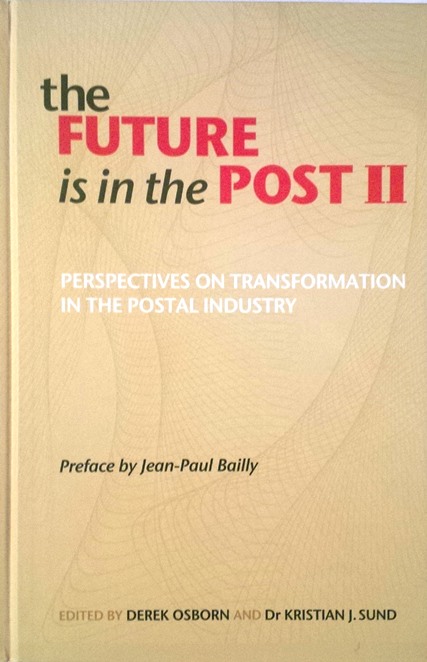- Home ›
- Data Protection ›
- Online Data Protection
Online Data Protection
The Medium is the Message: Part 2 of the article by Walter Trezek, published in The Future is in the Post II: Perspectives on transformation in the postal industry

At A Glance
Postal services are now data-driven, not item-driven, placing data protection at the core of new postal service provision. This article was written by Walter Trezek and published in The Future is in the Post II: Perspectives on transformation in the postal industry, Ed. Derek Osborn & Kristian Sund, 2011.
- Return to Part 1: The Medium is the Message.
The extension of postal service provision into the internet
The 2008 UPU Congress officially adopted the extension of postal service provision into the internet as a future work item, supported by technical standards to secure trust in the integrity and authenticity of hybrid, electronic and mobile communications.
Posts globally were quick to understand that this represented a paradigm shift.
Due to the global nature of the postal network, initiatives to enable posts to bring the classic trusted nature of postmarks – “the mother of all date and time stamps” – into the digital and mobile age had already begun to emerge a decade ago.
Although letter mail volumes themselves are declining, the letter mail value proposition of the privacy and integrity of each item, a proposition guaranteed and globally enforced by criminal law, is vital for the future development of ICT.
This privacy
guarantee, plus the global nature of the postal network, safeguarded by
designated postal operators in each and every country worldwide, is unmatched.
Online data protection

In order to upgrade this unique letter mail value proposition, posts worldwide have created an equivalent to the letter mail value proposition for the digital world, to extend the security of the letter mail piece into digital communication services.
The global postal network is regulated by a special United Nations organization, the UPU, with its members drawn from every country in the world. In 2004 (and in greater detail in 2008) the UPU created a regulated, secured electronic postal service in order to extend the postal service provision – nationally, regionally and globally – into the digital world.
In principle, posts have positioned themselves well. During the past decade a global network for secured electronic postal services has been established. The postal community has recognised the challenges emerging as a result of the internet and its most successful application, email.
In contrast to developments at the International Telecommunication Union (ITU), where the European member states in particular had no interest in regulating electronic communications as such, the UPU has regulated what it calls a Secured electronic Postal Service (SePS). These services bring the advantages of letter mail into the digital age, enabling users of such services to communicate in a binding, confidential and reliable way – just as it would be the case with a physical mail piece.
Yet again social and mobile media are driving development further. Fundamental rights such as online data protection, consumer protection, freedom of speech, privacy, and safeguarding the reputation of the individual are becoming more and more important.
Have postal services had their heyday?
Posts are operating in a declining market. The future is digital – physical mail communication is a thing of the past.
Most communications, even letter post items, have their origin in digital media. Letters are overwhelmingly composed and written using IT-based output systems. So it is true to say that “the original is digital” and is stored and archived digitally. The printed mail piece is simply a copy.
So the step
from a digitally composed mail piece to secured electronic distribution,
whether driven by governments or postal services, is a process of evolution
rather than revolution. Most would say that this evolution is due to be
completed sooner rather than later.

It is therefore no surprise that postal services in countries where third party players are large enough to have an impact on the letter post market have decided to actively drive forward the evolution from physical mail to secured electronic mail themselves.
Seeing the writing on the wall, they have become proactive, adapting their own business models before being overtaken by potential competitors. Too much is at stake for major postal service providers, some of whom are listed on national and international stock exchanges.
It is a major cultural change for posts to move upstream in the traditional postal value chain, to enter the market for output management solutions and drive what is known as “electronic substitution”.
Whenever governments start to actively drive electronic substitution, social-demographic indicators such as the next generation, who are accustomed to new ways of communicating, kick in. The impact on letter post volumes is dramatic. Yet postal services are preferring to drive this substitution themselves rather than leaving it to potential competitors with a more limited service portfolio.
Postal services – the core value proposition is trust

The core service provision of postal providers offers a unique proposition to the two parties involved in any letter post communication – authenticity, integrity and trust. These principles are safeguarded globally by national and international laws. This is the Trusted Third Party concept that postal service providers use as the cornerstone for future posts.
The electronic mailbox in the digital world will serve a similar purpose to the traditional mailbox in the physical world. One might argue that everyone online already has an e-mailbox.
Yes and no. Currently e-mailboxes are not quite the same as a traditional mailbox - the legal obligations associated with a physical mailbox are not yet valid for e-mailboxes.
However, as you read this, posts globally are going through the evolutionary process of adopting the concept of secured electronic mailboxes. (See Post Danmark, Macao Post)
All these developments are based on international standards and principles which aim at establishing global SePS networks, parallel to the physical networks which were established by postal service providers around 125 years ago and have been maintained ever since.
Do we have to accept the death of privacy?
We all know the dangers; some have experienced them already. There is a gap between the general use of killer applications such as email, Skype and social media, and the openness of the media.
Email is even less secure than a postcard. Anyone can listen into Skype. Social media is the best tool ever invented for mining data and generating in-depth profiles, no matter whether the person concerned is willing to share this information or not.
So what is the posts’ core value proposition in this new world of ubiquitous communication?
Posts will enhance the core values of the analogue letter post network and apply them in the digital age. The new offering will be secured, global communication, regulated by every nation, based on technical standards, guaranteeing the authenticity and integrity of any communication exchanged using the extended postal infrastructure.
The key feature will be online data protection, data security, paired with rights granted to the partners in any exchange of communication. Thus integrity can only be granted when authenticity can be guaranteed. The identity of parties to a communication must be proven.
Postal services have done this for decades in the classic postal world, both nationally and globally. Although extending this core knowledge into the digital age requires new processes, the core function remains the same.
Security is a core topic in the digital village. Neither individual identities, nor preferences and profiles should be compromised. What is needed is a trusted broker, one who manages identities, profiles or even preferences on behalf of all the parties involved, ensuring that fundamental rights are protected.
Postal services worldwide have understood this need and are working to extend the postal service provision into the internet by stepping into the role of trusted third parties and guaranteeing online data protection themselves.
Part 1 of the article starts here.
- Home ›
- Data Protection ›
- Online Data Protection
Does this article cover a topic relevant to your business? Access the CLS Business Lounge for the market intelligence you need to stay ahead of the crowd. Find out more







